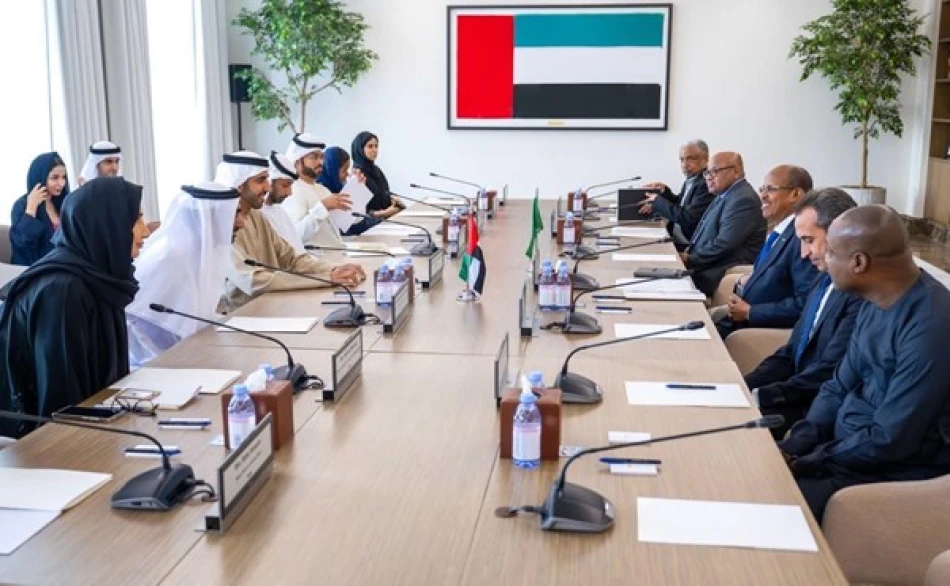
UAE and African Union Hold First Round of Political Consultations
UAE Deepens Africa Ties as Continental Investment Strategy Takes Center Stage
The United Arab Emirates and the African Union Commission have launched their first formal political consultations in Abu Dhabi, signaling a strategic shift toward institutionalizing what has already become Africa's largest foreign investment relationship. The discussions, building on agreements dating back to 2019, highlight the UAE's evolution from regional power to continental economic partner at a time when global powers are competing for influence across Africa.
From Informal Ties to Strategic Partnership
The consultations represent a maturation of UAE-Africa relations beyond traditional trade links. The framework, established through a 2019 memorandum of understanding and reinforced by a July 2025 health partnership agreement, creates regular diplomatic channels for coordination on shared priorities.
Both sides committed to intensifying technical coordination on issues of mutual interest and establishing regular political consultations to monitor progress. This institutionalization mirrors successful models used by China and Turkey in Africa, where formal diplomatic frameworks have preceded major economic expansions.
Economic Diplomacy in Action
Investment Leadership Position
The UAE has emerged as Africa's largest investor, a position that carries both economic opportunity and diplomatic responsibility. This investment strategy focuses on infrastructure, energy, and sustainable development—sectors that align with African Union development priorities and offer long-term returns in growing markets.
The timing is strategic. As Western investment in Africa faces scrutiny over historical patterns, and Chinese Belt and Road investments encounter debt sustainability concerns, the UAE's approach emphasizes job creation and capacity building in electricity, digitization, and youth empowerment.
Angola Connection Signals Broader Strategy
The recent visit by UAE President Sheikh Mohammed bin Zayed Al Nahyan to Angola gains particular significance given Angola's current chairmanship of the African Union. This diplomatic sequencing—high-level bilateral engagement followed by multilateral consultations—demonstrates sophisticated statecraft designed to maximize influence through existing African leadership structures.
Regional Security Calculations
The consultations addressed multiple regional flashpoints, including developments in the Horn of Africa, Sudan, Central Africa, and the Sahel region. For the UAE, these discussions serve dual purposes: supporting continental stability while protecting substantial investments across these regions.
The African Union Commission's renewed support for UAE sovereignty over the Greater Tunb, Lesser Tunb, and Abu Musa islands reflects the diplomatic dividends of sustained economic engagement. This backing provides the UAE with multilateral support in its dispute with Iran—a strategic gain that extends beyond bilateral relations.
Competing for Africa's Future
The UAE's approach contrasts with other major players in Africa. Unlike China's infrastructure-heavy model or the EU's governance-focused partnerships, the UAE emphasizes private sector-led development with government facilitation. This model appeals to African leaders seeking investment without extensive conditionality.
The focus on renewable energy and digitization positions the UAE advantageously as African economies modernize. With abundant capital and expertise in both sectors, the UAE can offer technology transfer alongside investment—a combination that creates lasting partnerships rather than simple commercial relationships.
Strategic Implications
These consultations signal the UAE's transition from regional to continental power broker. By institutionalizing relationships with the African Union while maintaining strong bilateral ties, the UAE creates multiple channels for influence and investment protection.
For African partners, the UAE offers an alternative to traditional Western donors and emerging Asian partners. The UAE's non-conditional investment approach, combined with cultural and religious affinities, provides African leaders with greater policy autonomy while accessing capital and expertise.
The emphasis on women and youth empowerment aligns with demographic realities across Africa, where young populations require economic opportunities and political participation. By supporting these constituencies, the UAE builds long-term relationships with Africa's future leadership.
Most Viewed News

 Layla Al Mansoori
Layla Al Mansoori






